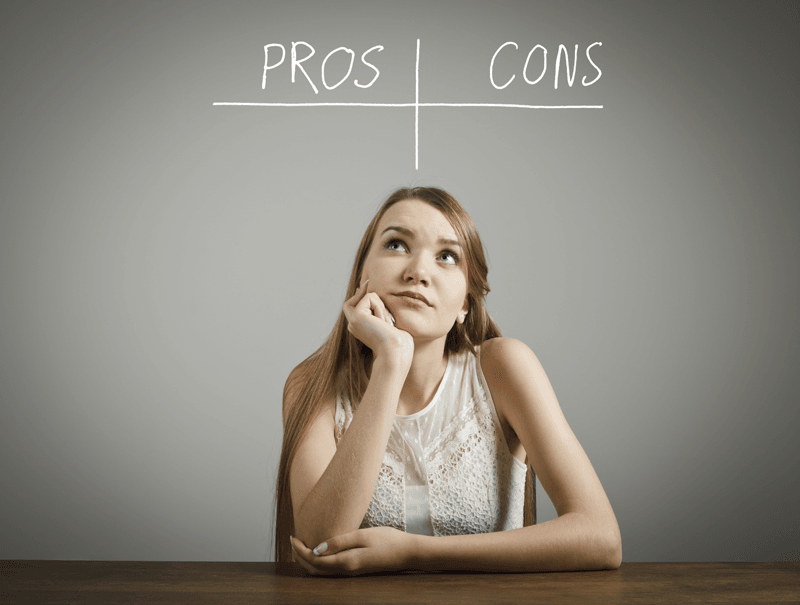What Are the Self-Publishing Pros and Cons?
Many prospective authors know they have a choice in how to publish their book, but may be confused about the self-publishing pros and cons that determine if it’s the right choice for their work.
Self-publishing is no longer simply a last resort for getting published when all else fails. Not only is it a viable path to success for a growing number of authors, but it holds several advantages. In fact, some successful authors who have already established themselves through traditional publishing are now choosing to self-publish some of their work. Some observers are even predicting the eventual decline of traditional publishing as we know it. Whether or not this is a reality, it’s clear that self-publishers are claiming a growing share of the book market, accounting for a whopping 90% of sales of romance genre fiction, and 38% of overall ebook sales in the last nine months of 2017, according to Author Earnings. That figure has been projected to hit 50% by 2020.
So what are some self-publishing pros and cons? After all, it wasn’t so long ago that it was a path only considered by authors who were unable to earn a book deal with a traditional publisher. An understanding of self-publishing pros and cons will help you figure out if self-publishing is right for you.
Pros of Self-Publishing
One of the strongest draws for self-publishing is the added control over your own work and the revenue it generates.
When you accept a deal from a traditional publisher, you lose creative control over aspects such as interior and cover, marketing strategies, and possibly even your book’s title. Your book’s content could be altered by an editor with a vision for your book that doesn’t match yours. This was once simply part of the deal to get a book published, but today’s authors can opt to self-publish and ensure they have the final word on all aspects of their book. At the end of the day, why settle for anything less when you’ve already invested so much time and effort?
If that weren’t enough, authors also lose a significant portion of royalties when signing on with a traditional publisher. Royalty rates generally fall between 7% and 25%, and the higher end of that range is unusual. Discounts, returns, and marketing costs are taken off the top before calculating your royalty percentage. When self-publishing an ebook with Amazon, the most popular option, royalty rates range as high as 70%, for ebooks priced between $2.99 and $9.99. Both lower priced and more expensive ebooks will generate 35% royalties, still beating out traditional publishing.
Genres
As mentioned earlier, self-publishing has virtually taken over certain genres, such as romance, and to a lesser extent, sci-fi and fantasy. In these genres, vibrant online communities provide a platform for authors to interact directly with their readers, receiving feedback without a slow, lumbering traditional marketing apparatus, with an affinity for broad generalizations, acting as a gatekeeper. Those same communities, along with the unlimited availability of ebooks as opposed to physical books, allows readers to find and buy as many books as they can read. In addition, the straight narrative format of genre fiction is well-suited to reflowable screen-reading on Kindle and other devices.
To top it all off, self-publishing is instantaneous. As soon as it’s ready, your book can be available to readers. Books can take six to eighteen months to hit shelfs through a traditional publisher.
Cons Of Self-Publishing
This is where you might be asking, what’s the catch? Well, self-publishing does have its cons. For one thing, you’re on your own when it comes to editing, formatting, and design costs. And without enlisting the services of a hybrid publisher, you’re also on your own when it comes to choosing your approach to these parts of the process. This is where many self-publishing authors fall short, contributing to the vast quantity of mediocre content regularly published online. And in many cases, the writing is not the problem – it’s the lack of professional editing, design, formatting, and promotion that stops many authors from reaching the level of traditionally published, well-polished, releases.
So the fact that no one’s there to stop a self-publisher from publishing a sub-par book is one of the strongest cons of self-publishing – but one you can avoid falling victim to. Since you’re not an expert in every step of the process, a hybrid publishing service becomes invaluable, connecting you to professionals who can bring traditional publishing quality to your self-published work.
Self-Publishing Sales
Another con is that overall sales will, generally speaking, likely be lower. This is not necessarily the case, and also depends on your marketing and distribution efforts.
Finally, certain genres have proven less susceptible to the self-publishing revolution than others. To name some examples, writers of children’s literature and literary (non-genre) fiction are still finding that traditional publishing is the way to go. These kinds of writing still depend heavily on the trade networks that have developed over decades of traditional publishing, connecting publishers, reviewers, readers, teachers, and librarians.
Of course, self-publishing could eventually begin making inroads in these areas too.
Self-publishing pros and cons demonstrate that some authors are better suited for self-publishing than others. But in many cases, the cons of self-publishing can be compensated for with a strong plan for the publishing process beyond writing – editing, design, distribution, and marketing.







